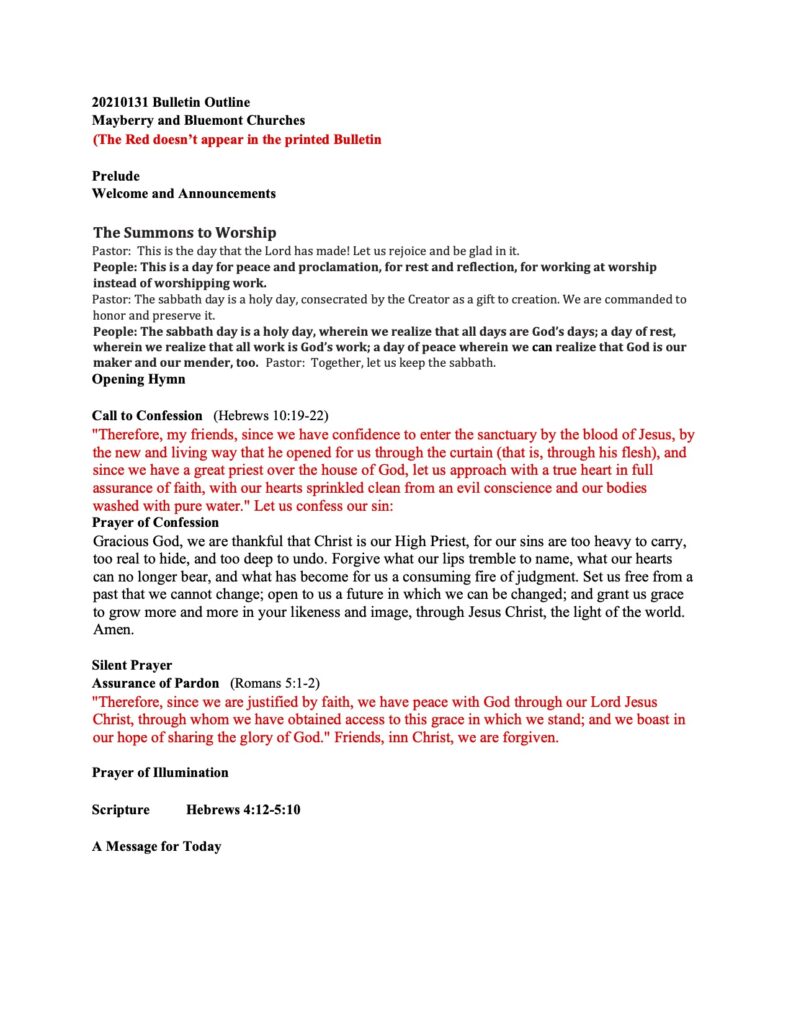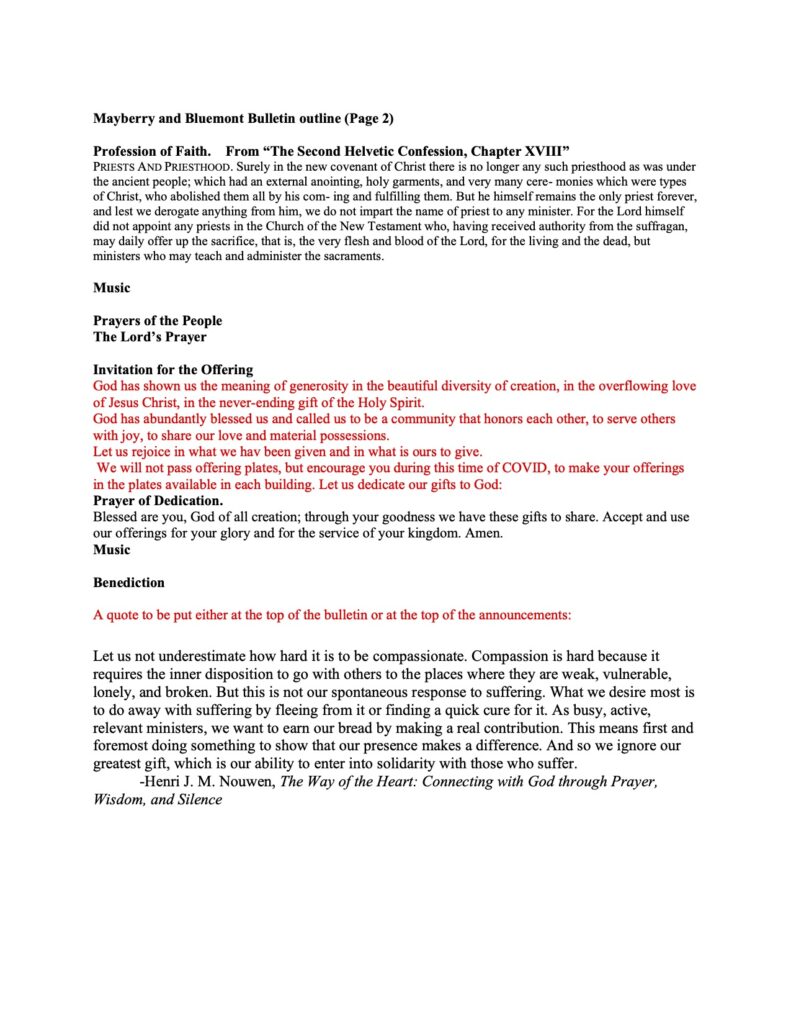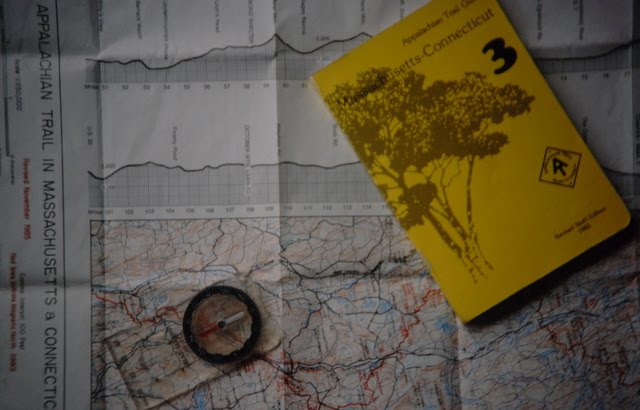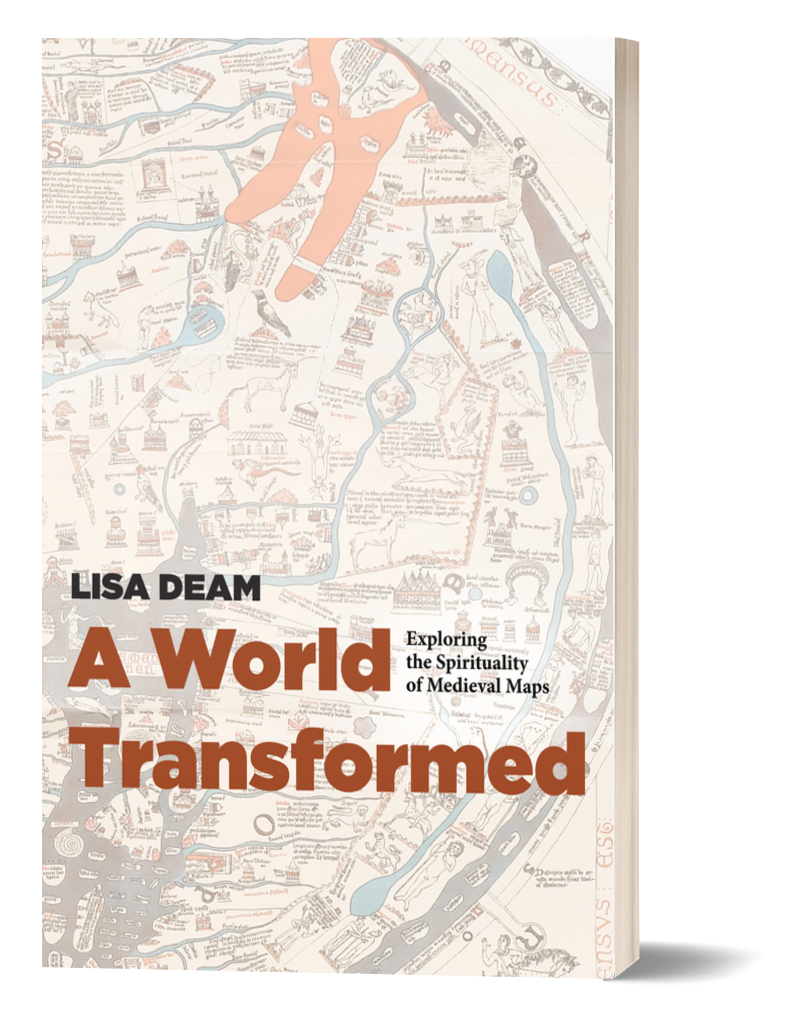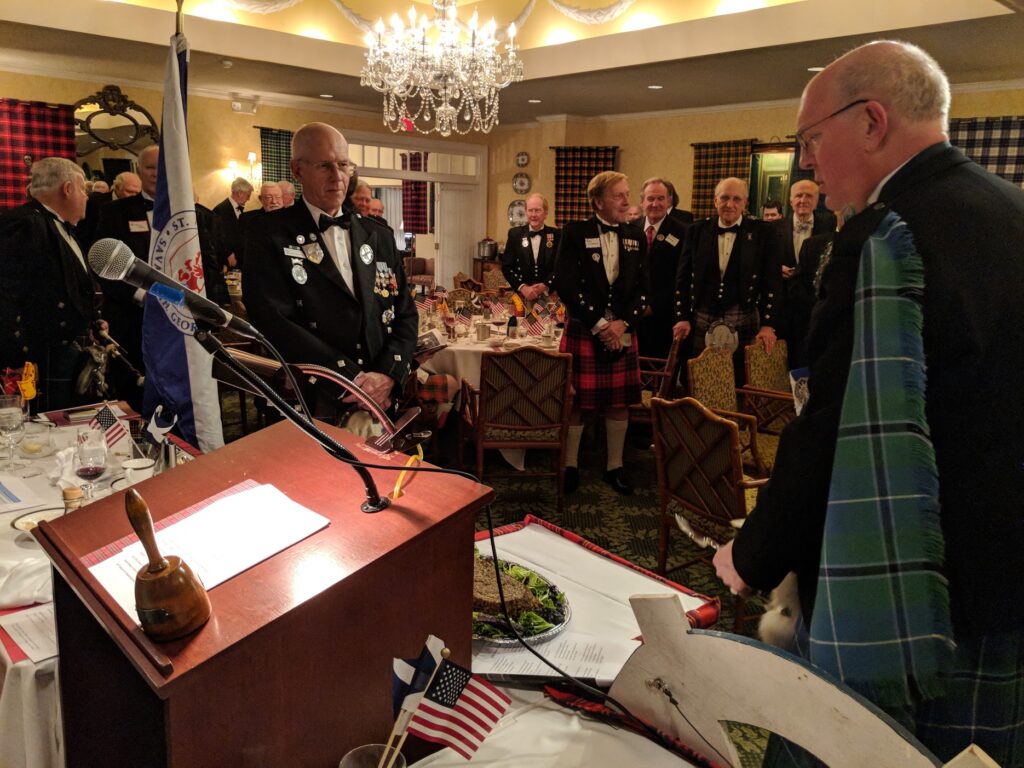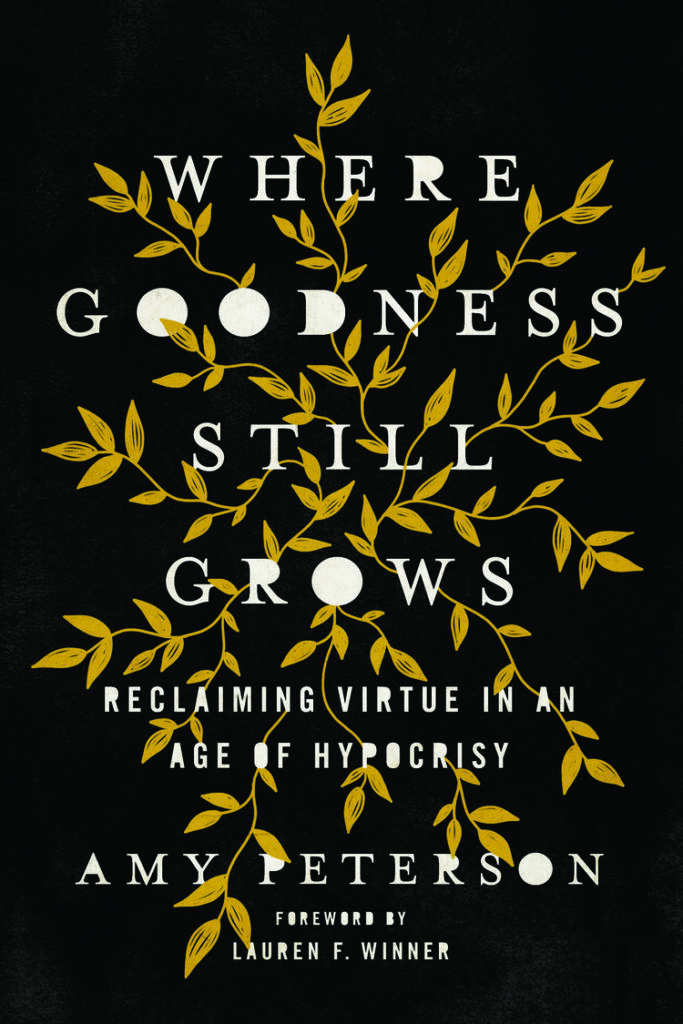As we are expecting bad weather tomorrow, with snow overnight topped by freezing rain early in the morning, worship services at Bluemont and Mayberry Churches are cancelled. I have included copies of the bulletins and announcements from each church at the bottom. Stay safe!
Jeff Garrison
Mayberry and Bluemont Churches
January 31, 2021
Hebrews 4:14-5:10
c2021
At the beginning of Worship
We’re continuing our study of the Book of Hebrews today. As I have reinforced each week we’ve been in this book, its central theme is the superiority of Christ. Today, we will read that Christ is our high priest, but this is just a way to say that Jesus is superior to the priests of the temple during Jesus’ day. Priests served as the link between a holy God and a sinful people. But as the High Priest, Jesus replaces the need for other priest and opens the door that we all might be in fellowship with the divine. To say this another way as we’ve seen in Hebrews, Jesus adopts us into God’s extended family.
Let me say give you another tidbit about how Hebrews is constructed. I’ve talked before about how the author builds on what’s already covered to make his case. Another trick the author uses is to drop hits as to where he’s going. While this section is about the role of Jesus as a high priest, he’s already mentioned this role of Jesus twice before.[1]Furthermore, in this section, with Melchizedek, the author drops hints about where he’s heading. He’ll come back to him in the 7th chapter.
After the reading of the Scripture
Let me start with an interesting footnote on this section of scripture that I just read. I’ve pointed out before that chapters and verses were not originally a part of the scriptures, that they were added centuries after the text were written as a way to help us find things. Because of this, verses and chapters can be somewhat arbitrary. This section, which begins with the 14th verse of the 4th chapter is such a case. Some older translations including Tyndale’s English translation and Luther’s German translation began Chapter 5 with verse 14.[2] This is a reminder that the new chapters don’t always mean new thoughts, as we see here.
A True Story
Let me tell you a true story. When I was sixteen, four months after passing the driver’s test and getting my license, I was in an accident. It was early Sunday afternoon. My father was working this day, so mother took us kids to church. On the way home, she let me drive. I felt so big. It was also a blessing that mom was with me, right beside me in the front seat. This mean she knew I wasn’t to blame for the accident. Had she not been there, I’m sure it would have somehow been my fault.
We were driving down Shipyard Boulevard, which had three lanes heading east. I was in the far-right lane as my turn was only a few streets ahead. Suddenly, a car in the far-left lane made an immediate right-hand turn. The woman driving must have realized she was about to miss her turn. She cut across two lanes of traffic.
I slammed on the brakes and T-boned her car in the front quarter-panel. This was in 1973. I was driving a car built in 1969, before cars came with shoulder straps. I remember flying through the air, then the waist belt caught me. I was then thrown forward and hit my head on the steering wheel hard enough to crack it. See, I now have an excuse. Any mental challenges I can blame on that accident.
I was knocked out. A policeman and an ambulance came. I was whisked away to the emergency room. With me gone, our neighbors who were leaving their church, happened to drive by. They gave my mother and siblings a ride home. My mother called my father where he was working. He came to the hospital to check on me. As we were leaving, the police officer came to the hospital with a citation. He charged me with “following too close.” I was furious. I told the cop he was crazy. My father immediately grabbed me and told me to be quiet.
Dad then asked the officer about the accident and the position of the cars. After explaining that I hit her car in the front passenger quarter panel, my father, very calmly said, “Jeff’s right. There’s no way he could have been following too close.” The officer said, “Well, that’s my findings.” My father response was, “We’ll see you in court.”
The Neighbor to the rescue
Now, remember the neighbors who picked up my mother and siblings. The father just happened to be a State highway patrolman. When he heard I was charged with the accident, I think he was even more incensed than my father. That afternoon, he took my father and me to the scene and we measured everything off and took pictures. Then we went to where they’d towed the cars and took more pictures. Then he drew up on a large sheet of paper the accident and wrote up his findings. Because he worked for a different agency, he did not feel he could take this information to the police department. Instead, he told my dad to give to an attorney. And he said if the attorney had any questions, to call him.
Now, I was a bit upset over the reason he told my dad to obtain an attorney. “You don’t want a sixteen-year-old on the witness stand by himself,” he said. “The DA and the officer could get him (that’s me) confused and the trial might not go well.” So, my father hired an attorney. We met with him for maybe 15 minutes. He took all the drawings and photos and said, “I think I can take care of this.” I didn’t even have to appear in court. Her insurance paid for the accident and the citation was thrown out.
The Need for an Advocate
While I was a cocky 16-year-old, who didn’t think I needed an attorney, there’s something good about having an advocate, one who can help plea your case. This goes both in a courtroom and before God. That’s why, in the Old Testament, you had a high priest. This dude was to take the petitions and our confessions of the people to God. The high priest was to seek mercy on our behalf.
Last week, we learned that the Book of Hebrews encourages us to “take a break.” We have the Sabbath which serves as a foretaste of paradise, an eternal rest. We can rest because God is active in our lives and world. Where this activity is best seen is in the life and work of Jesus Christ. Not only can we trust ourselves to take a break because Jesus watches over us, but Jesus has us eternally in his hands.
What is our confession?
Because of whom Jesus is and what Jesus has done, the author/preacher of Hebrews calls on us in the first verse of our reading to hold fast to our confession. Now, when we think of our confession, we might think of the Apostles’ Creed, or the even older Nicene Creed. While these creeds flesh out our knowledge about Christ, especially our understanding of the incarnation (God with us) and the Trinity, there’s an even older creed that we see in the writings of Paul. “Jesus is Lord” is perhaps the first basic Christian Creed.[3] Such a creed fits right into Hebrews emphasis on the superiority of Jesus Christ.
By affirming this creed, that Jesus is Lord, or Jesus is superior, we acknowledge our relationship to Jesus, but we are also acknowledging that Jesus does something for us no one else can do. We get into this special work of Jesus as we look at the work of the High Priest.
Jesus as the High Priest
There are a number of essential characteristics of the High Priest that’s outlined in the first ten verses of Chapter 5.[4] Such a priest must sympathize with our weakness. This highlights the importance of the incarnation. Jesus had to become one of us, in order for him to understand what we must endure in this life. The High Priest must be a mortal. Jesus, by becoming human, fulfills this. But unlike the High Priests of the temple, who had to do special sacrifices to purify himself before he could offer the sacrifices for the people’s sin, Jesus sinless state allows him to make that sacrifice for us. The author will go into more detail about the sacrifice later in the book.
Another characteristic is that High Priest position isn’t something for which one can strive. It is a position that must be chosen by God. The Preacher of Hebrews highlights this with two quotes from the Psalms. The first quote, from Psalm 2:7, “You are my son, today I have begotten you.” We’re already heard this quote in the opening paragraph of Hebrews and the opening of this quote is similar to what was heard from heaven when Jesus was baptized by John.[5] In the second quote, from Psalms we’re told that Jesus is a priest forever and we’re reintroduced to this guy from way back at the time of Abraham, Melchizedek.[6] The author of Hebrews doesn’t make a big deal out of Melchizedek at this point. Instead, he’s drops a teaser. We’ll learn more about Melchizedek later, but for now we are shown that Jesus’ role as High Priest was bestowed on him by God the Father.
Our Need for a High Priest
The important thing we learn from this passage is not how Jesus became high priest or his qualifications for the assignment. For us, the important thing is that we have a high priest. We have someone who has been where we are in life and knows what we endure, someone who empathizes with our struggles. Because Jesus is our high priest, we can approach him honestly in our prayers, laying our burdens and concerns out before him. We can be assured that Jesus will listen to us and represent us before God the Father. But unlike an earthly advocate, like that attorney my father hired for me, Jesus doesn’t just make sure our side is told. As we dig deeper into this book, we’ll see that Jesus covers us with his own righteousness and pays any penalty we own for our transgressions.
As a high priest, Jesus offers us more than any earthly priest. Jesus is Lord. That’s our confession. Believe in him. Follow him. Love and worship him. Amen.
[1] See Hebrews 2:17 and 3:1
[2] F. F. Bruce, The Epistle of the Hebrews (Grand Rapids, MI: Eerdmans, 1964), 84 n. 1.
[3] Romans 10:9 and 1 Corinthians 12:3.
[4] Different scholars outline these characteristics differently. Bruce, 94, splits it into two: 1. Divine appointment and 2. Ability to sympathize with His people. Johnson breaks it down into 12 parts: 1. Taken from among humans, 2. Behalf of humans, 3. In matters pertaining to God, 4. To offer gifts and sacrifices, 5. For sins. The High Priest must also 6. Deal gently with ignorant and wandering people, 7. Share their weakness, 8. Offer gifts for himself, 9. As well as the people. The High Priest must also 10. not chose himself, 11. But be chosen by God, 12. As was Aaron. See. Luke Timothy Johnson, Hebrews: A Commentary (Louisville, KY: WJKP, 2006)), 137.
[5] Matthew 3:13-17, Mark 1:12-13, Luke 4:1-13. At the baptism, the word from heaven is “This is my Son, the Beloved, with whom I am well pleased.
[6] Genesis 14:18. Melchizedek was this mysterious “King of Salem” to whom Abraham offered a tithe to.
Bluemont Announcements
- Starting Monday, February 1, the pastor will be holding a “Zoom” Bible study looking at the previous week’s sermon along with the upcoming week’s scripture readings. The study will begin at 1 p.m. and last up to an hour. It will only be available virtually. To attend, please send an email to the pastor at parkwayrockchurches@gmail.com. On Monday mornings, you will receive an email with an invite for the Bible Study.
- The Souper Bowl offering for the Carroll County Social Services for medicine and fuel for the elderly will be taken on Sunday, February 7. Envelopes will be provided.
If you have a need to contact Rev. Dr. Jeff Garrison, you may reach him on his cell number 269-804-9793 or email him at parkwayrockchurches@gmail.com. His mailing address is P. O. Box 140, Laurel Fork VA 24352. Visit Pastor Jeff’s blog at https://fromarockyhillside.com .
Mayberry Announcements
This Morning – “Two Cents-A-Meal” Offering
Mayberry’s monthly hunger offering (which addresses hunger right here in the mountains of southwest Virginia) will be received this morning. Based on Mayberry’s grant applications, the Meadows of Dan Back Pack Program, and Harris Chapel’s Food Distribution ministry have previously received grants from the Presbytery’s “Two Cents” hunger program. Gifts may be placed in the offering plate using the envelopes found in today’s bulletin.
Monday (2/1) – Zoom Bible Study – 1:00-2:00 pm
Something Brand New … Tomorrow, for the first time, Pastor Jeff will be holding a “Zoom” Bible Study looking at the previous week’s sermon … and … the upcoming week’s scripture readings. The study will begin at 1:00 pm and last up to an hour.
It will only be available virtually. To sign up … please send an email to the pastor at parkwayrockchurches@gmail.com. Then each Monday morning, participants will receive an email from Jeff with the “invite” for that afternoon’s Bible Study.
Monday (2/1) Addiction Recovery Support Group 7:00 pm
Persons fighting addictions gather on Monday evenings for prayer and mutual support to strengthen their use of the AA’s 12-step discipline. Somebody you care about may be fighting an addiction that is limiting the blessings their life with the Lord will bring them. Call Deborah Reynolds, at 276-251-1389, for more information.
Thursday (2/4) – Ruritan Meeting – Via Zoom – 7:00 pm
February’s Calendar – Ash Wednesday – Lent – Easter, etc.
February’s Calendar is included in this morning’s bulletin. The Lenten Season begins on the 1st Sunday in Lent (2/14) … Ash Wednesday follows on (2/17) … Palm Sunday and the beginning of Holy Week on (3/28) … and Easter Sunday on April 4th. The Session has not yet mapped out our full set of plans for 2021’s Lenten/Easter Season – it is considering how Covid will impact our Easter celebrations. For example, do Covid restrictions prevent our normal Imposition of Ashes service on Ash Wednesday? Can we add an Easter Sunrise Service to our Easter Sunday celebrations? Stay tuned … decisions are on the way!
Meadows of Dan’s January 27th Blood Drive Results
A nice turnout at this past Wednesday’s Blood Drive produced 34 units of Blood. We’re told by the Red Cross that those donations will have a lifesaving impact on 102 persons needing medical care. The Red Cross also tells us that they have received nearly 300,000 fewer donations since Covid infections surfaced last March. Our next blood drive will be March 24th. We hope you will join us that day. More important we hope you will call
1-800-RED-CROS and schedule your time for donation. You can do that beginning as early as March 1st.
Bulletin Outline for Both Churches
